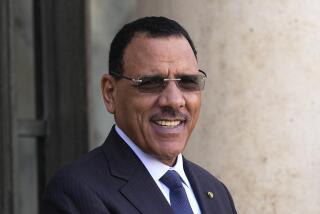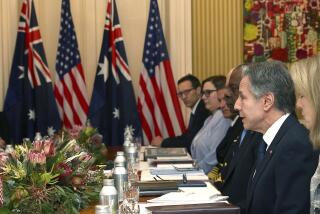Hillary Clinton says U.S. not pushing for ouster of Egyptian President Mubarak
- Share via
Reporting from Washington — Secretary of State Hillary Rodham Clinton on Sunday called for Egypt to move toward “real democracy” but also made clear that the United States was not demanding that embattled President Hosni Mubarak step down in the face of continuing demonstrations.
In a series of television interviews, Clinton also eased slightly off the administration’s threats on Friday to yank Egypt’s billions in aid, saying such a step was not now under discussion.
Clinton spoke warmly of the Egyptian military as a “respected institution” and advised it to help move the country from its current unrest to an “orderly transition.”
“We are urging the Mubarak government, which is still in power; we are urging the military, which is a very respected institution, to do what is necessary to facilitate that kind of orderly transition.”
She spoke to NBC’s “Meet the Press,” “Fox News Sunday,” ABC’s “This Week,” CBS’ “Face the Nation,” and CNN’s “State of the Union.”
U.S. officials are looking for what they are calling “managed change” -- a gradual transition to elections that lead the way to a greater sharing of power and economic reforms. With the Iranian revolution of 1979 in mind, they fear an abrupt transition that would lead to turmoil and a possible seizure of power by what they feel is the wrong kind of leadership.
Egypt has a powerful military that has kept the ruling party in place for more than 30 years. Its largest and best-organized opposition group is the banned Muslim Brotherhood. In this environment, other opposition groups have not been able to develop, and that absence could make a democratic transition difficult.
Although the United States has been prodding Mubarak for days to do more to move toward reform, it has avoided becoming too specific out of a desire to allow Mubarak some running room.
Clinton avoided offering any opinion on Mubarak’s choice to appoint a new vice president, prime minister and Cabinet on Saturday. She sought to avoid any specific comment on Mubarak and his fate in the job.
Asked if the administration was backing away from the 82-year-old leader, she said: “We don’t want to send any message about backing forward or backing away.”
Clinton said the military “appears to be showing restraint” in its handling of demonstrations so far. But she said the situation remained “volatile and complex.”
“We want to see an orderly transition ? so that no one fills a void -- that there not be a void,” she said.
She said the government needed to open a political conversation with Egyptians who had “legitimate grievances.”
“There are many steps that can be taken by reaching out to those who have advocated a peaceful orderly transition,” she said.
Clinton made clear that the United States believes the political evolution in Egypt will take time.
The administration’s support for the opposition in Egypt and other Arab countries has been a source of controversy for two years, with some critics saying the administration has not pushed Arab governments hard enough for change.
But the administration’s handling of the Egyptian crisis won general support on Sunday from House Speaker John Boehner (R-Ohio).
He told Fox that the administration had “handled this tense situation pretty well.”
Some European governments have been speaking out with a message similar to that of the administration. William Hague, the British foreign secretary, said in a Twitter message Sunday that the Egyptian government should open a “clear path toward an open society based on democratic values.”
More to Read
Sign up for Essential California
The most important California stories and recommendations in your inbox every morning.
You may occasionally receive promotional content from the Los Angeles Times.











